Dev Diary #75 - Diplomatic Improvements in 1.2
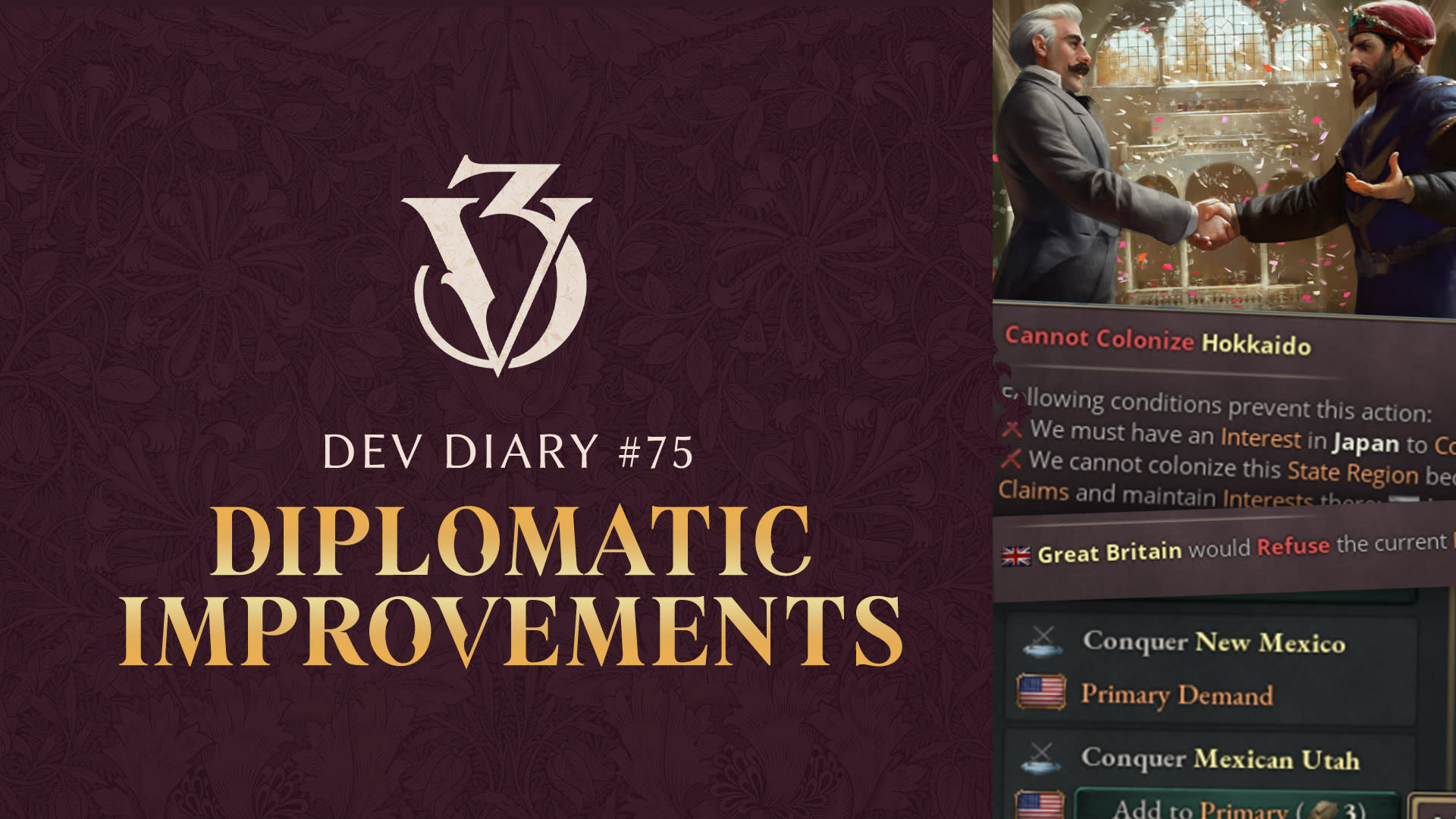
Hello and welcome to another Victoria 3 Dev Diary about Update 1.2! By now the Open Beta is of course in full swing, and everything in this post will either already be available to try out or be part of one of the upcoming updates to the Open Beta in the following weeks. However, we still want to take the time to properly outline the changes we’re making to the game in 1.2 for those who either don’t want to opt into the Open Beta or are just interested in more detail and context. Today’s Dev Diary will be focusing on changes on the Diplomatic side of the game, both in terms of new functionality and AI.
The first improvement we’re going to go over today is Colonial Claims, which is a change to Colonization that is intended to prevent some of the more ahistorical nonsense we have going on in colonization at the moment, such as countries rushing for Hokkaido before Japan can get it or the United States setting up shop in Tierra del Fuego. Quite simply, what it means is that some countries now start with claims on states owned by Decentralized Nations, and any country which *doesn’t* have a claim on that state is blocked from colonizing it so long as the claiming state maintains an Interest there.
As an example, the Hudson Bay Company starts with a claim on Alberta in 1.2, while the United States of America does not, which means that the USA cannot start just colonizing into Canada without first forcing the HBC to revoke their claim through the use of a ‘Revoke Claim’ war goal. Similarly, Chile and Argentina have overlapping claims on some parts of Patagonia and thus are able to race each other for it, but won’t have it sniped away from them by a Belgium with grandiose Latin American ambitions.
While we’re on the topic of colonization, I should also mention that something else we’ve changed to improve how it plays 1.2 is how the Native Uprising diplomatic play works. In 1.1.2, a colonizer that defeats a Native Uprising would annex the entire native Decentralized Nation, which led to some weird pacing and balance issues. This has been changed to instead give the colonizer a special ‘Colonial Rights’ diplomatic pact with the defeated natives, which lasts for the duration of the truce. During this period, colonization speed is doubled and no further uprisings can occur from that particular Decentralized Nation.
It is no longer possible to simply snipe Hokkaido away from the Japanese Shogunate, as they start with a claim on the Ainu-controlled parts of the island
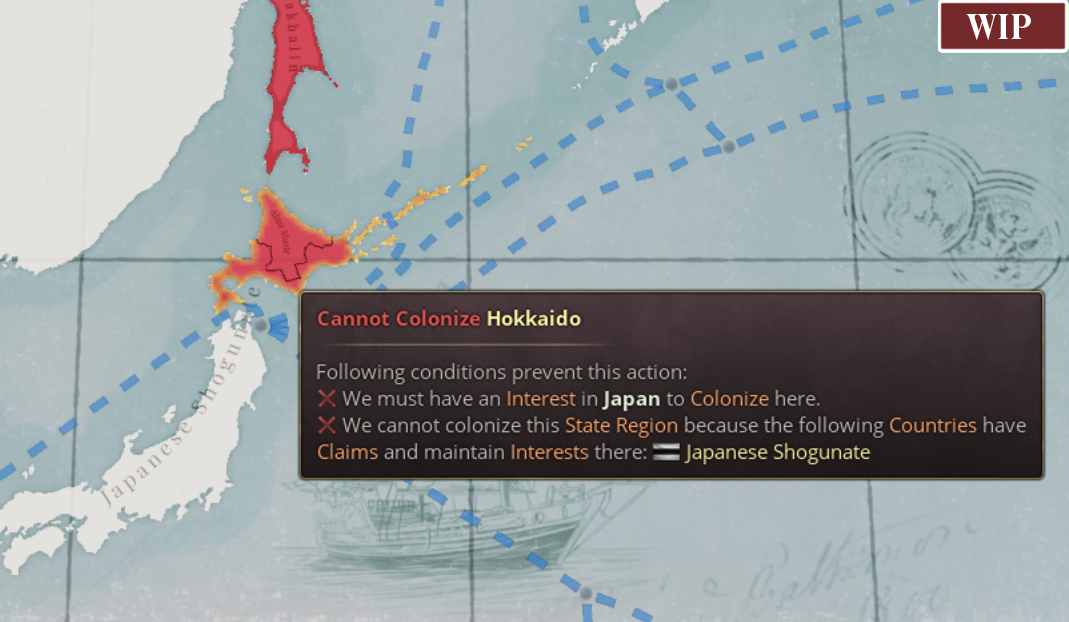
Next up is a change to Diplomatic Plays that allows countries to expand their Primary Demands in a play. An issue that has been repeatedly identified by players since release is that once they grow strong enough, the AI has a tendency to back down against them in plays, ceding one war goal at a time and setting in place a five-year truce before the next demand can be made. While this does fit with the design principle that there should be a reason to want to back down, the end result could end up unduly frustrating and wasn’t just an issue for the player, either, as the AI of the USA struggled to reach the West Coast when it could only take one state off Mexico at a time.
To address this in a way that directly tackles the problem while still ensuring that it still isn’t simply best to always take your chances with a war, we’ve changed the concept of Primary Demand (ie the first war goal added, which gets enforced when backing down) to Primary Demands, which will all be enforced when the enemy backs down, and Secondary Demands, which will only be relevant if the play escalates to war. Just as it works right now, the first war goal added on each side is always a Primary Demand, but there are now ways to add more Primary Demands beyond the first.
Firstly, any war goal targeting the main opponent (or any of their subjects) that is added by Swaying another country to your side will now automatically be a Primary Demand. In other words, if you’re launching a play against France and they’re being supported by Spain, any country you sway to your side with a war goal targeting France will have that war goal added as a Primary Demand, while war goals targeting Spain are Secondary Demands. The AI understands this and will place higher value on Primary Demands, since they are much more likely to actually receive what’s promised by the war goal in the end.
Secondly, any war goals you yourself add can be made into Primary Demands if they target the main opponent (or any of their subjects). However, doing so is considered less ‘justified’ than adding Primary war goals through swaying, and so will cost an amount of maneuvers and generate an amount of infamy proportional to the cost of adding the war goal in the first place. This means that while adding more Primary Demands for yourself ensures that you receive them if you end up making them back down, it isn’t free, and is done at the expense of adding additional war goals or swaying more countries to your side. The AI is also going to receive some tweaks here to make them less likely to back down if you keep piling on Primary Demands, as at a certain point the unreasonableness of the demands just becomes too much to take without making a fight of it.
The cost of expanding your Primary Demands is entirely relative to the cost of the wargoal, so in the case of taking the small and depopulated state of Utah, it’s quite low

On the topic of AI, we move on to the final topic for today’s dev diary: Peace AI and War Exhaustion mechanics. Both of these have received a bunch of improvements in 1.2, though most of these improvements have not yet made it into the Open Beta. War Exhaustion, of course, is the rate at which a country’s War Support drops towards -100, at which point they are forced to capitulate. In the 1.1.2 version of the game, the main driver of War Exhaustion is occupation of territory, particularly wargoals and the capital, leading to the much-maligned ‘just naval invade Berlin’ meta.
In 1.2, you still get War Exhaustion from occupation, but the amount gained from occupied wargoals/capital is less, and War Exhaustion from occupation of other territory now scales non-linearly, with severity increasing rapidly as the country approaches full occupation: a fully enemy-controlled Modena will still capitulate quickly, while a Russia that has lost control of a few states in the Caucasus is barely going to be affected. Instead, the primary driver of War Exhaustion is now casualties and battles lost. War Exhaustion from Casualties now scale against the total available manpower for the country instead of its Population, so a country with an army of 10,000 is going to be much more affected by 5000 casualties than a country with an army of 100,000, even if the two countries have the same overall population. For available manpower, all regular battalions are counted (whether mobilized or not), but conscripts are only counted once they’re actually called in - so calling up more conscripts can be a way to directly affect your War Exhaustion rate.
Furthermore, War Exhaustion from Casualties now scales against the % of battles (proportional to battle size, so a battle of 100 battalions vs 100 battalions counts more than one of 5 vs 1) that your side of the war has lost. What this means is that a country which keeps winning battles can absorb far more losses than one which keeps losing them, and allows for battlefield victory to play much more directly into achieving overall victory in the war.
Even though the amount of casualties relative to army size are fairly similar owing to the massive Qing army, the British are losing war support at a much slower rate due to their string of battlefield victories
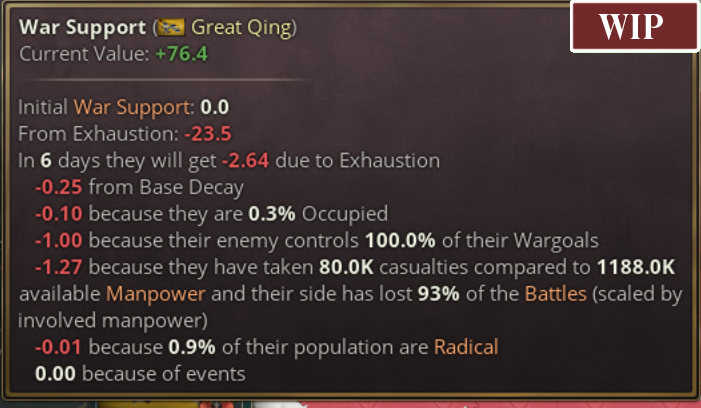
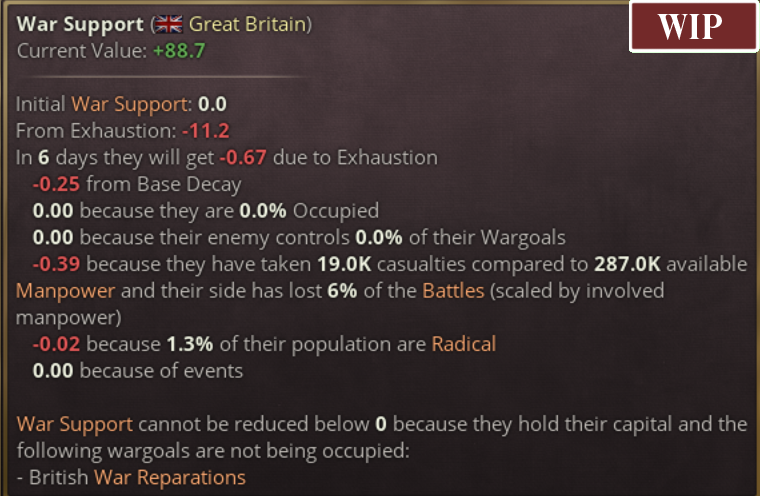
The AI for making peace has also received some upgrades. In addition to now just being better at constructing equitable peace deals through a rewrite of the core logic behind AI-made peace deals, the AI has also been made to consider more angles when deciding whether or not a peace deal is acceptable. Firstly, a new factor has been added called ‘achievable wargoal’, where the AI looks at whether a war goal is likely to be gained by the side that holds it through the capitulation of the target if a peace deal is not signed. Such wargoals, if held by the AI, will make them far more reluctant to sign peace unless those wargoals are part of the peace, while they are simultaneously more likely to accept the enemy pressing wargoals against them that they’d just lose anyway if the war continued. Secondly, the AI now looks at more additional factors for peace (such as the relative military strength of the two sides) and other factors have been tweaked, for example the size of AI Gold Reserves now has less importance than it used to.
Even though the Qing are offering considerable concessions, the British AI will refuse this peace deal because they believe they can get everything they want anyway once Qing is forced to capitulate
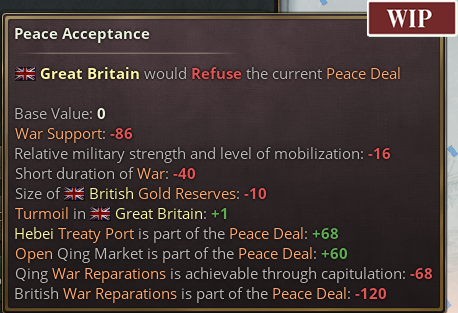
That’s it for today! This is of course not an exhaustive list of everything that’s been improved diplomacy-wise in 1.2, and there are a number of improvements still planned for future Open Beta updates, particularly on making the diplomatic AI behave in a more plausible way and be better at sticking by important allies, but details on that will have to wait for another day. Next week, we continue talking about the 1.2 Update as our tech lead Emil will tell you all about the improvements we’ve made to Performance. See you then!
